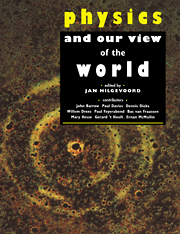Book contents
- Frontmatter
- Contents
- Foreword
- Introduction
- 1 Questioning the answers or Stumbling upon good and bad Theories of Everything
- 2 Theories of Everything
- 3 The scientific view of the world: introduction
- 4 Enlarging the known world
- 5 The world of empiricism
- 6 Has the scientific view of the world a special status compared with other views?
- 7 Quantum theory and our view of the world
- 8 Interpretation of science; science as interpretation
- 9 Problems in debates about physics and religion
- 10 The mind of God
- 11 The sources of models for God: metaphysics or metaphor?
- Discussion
- Notes on contributors
- Bibliography
- Index
1 - Questioning the answers or Stumbling upon good and bad Theories of Everything
Published online by Cambridge University Press: 04 December 2009
- Frontmatter
- Contents
- Foreword
- Introduction
- 1 Questioning the answers or Stumbling upon good and bad Theories of Everything
- 2 Theories of Everything
- 3 The scientific view of the world: introduction
- 4 Enlarging the known world
- 5 The world of empiricism
- 6 Has the scientific view of the world a special status compared with other views?
- 7 Quantum theory and our view of the world
- 8 Interpretation of science; science as interpretation
- 9 Problems in debates about physics and religion
- 10 The mind of God
- 11 The sources of models for God: metaphysics or metaphor?
- Discussion
- Notes on contributors
- Bibliography
- Index
Summary
Summary
The last two decades witnessed a new breakthrough of fundamental physics in its struggle towards a better understanding of the World of the Small. This gave rise to new speculations concerning the idea that there may exist a single ultimate Law of Physics underlying all particles and forces, and therefore also everything made out of these particles held together by these forces, which could include us and the universe. Discovering this Law would be a tremendous achievement, but would not at all imply our understanding of most of its consequences. In this chapter I focus on two themes:
Speculations that such a fundamental Law exists and that there is a possibility that we humble human beings may in due time be able to find this Law and give a detailed and precise formulation of it — including boundary conditions and initial conditions if necessary — are far from ridiculous (Section two), in spite of lessons from the past. Our present knowledge indicates that the possibility is real (Section three).
Claims made by several theoretical physicists that they are coming very close towards actually realizing this hope are highly premature and naive. ‘Superstring theory’ is almost certainly not the answer. The dispute concerning the physical interpretation to be given to the formalism called ‘quantum mechanics’ will have to be continued, and it is as yet impossible to predict the vastness of the undoubtedly formidable obstacles that are still in our way (Sections four and five).
Information
- Type
- Chapter
- Information
- Physics and our View of the World , pp. 16 - 37Publisher: Cambridge University PressPrint publication year: 1994
Accessibility standard: Unknown
Why this information is here
This section outlines the accessibility features of this content - including support for screen readers, full keyboard navigation and high-contrast display options. This may not be relevant for you.Accessibility Information
- 1
- Cited by
